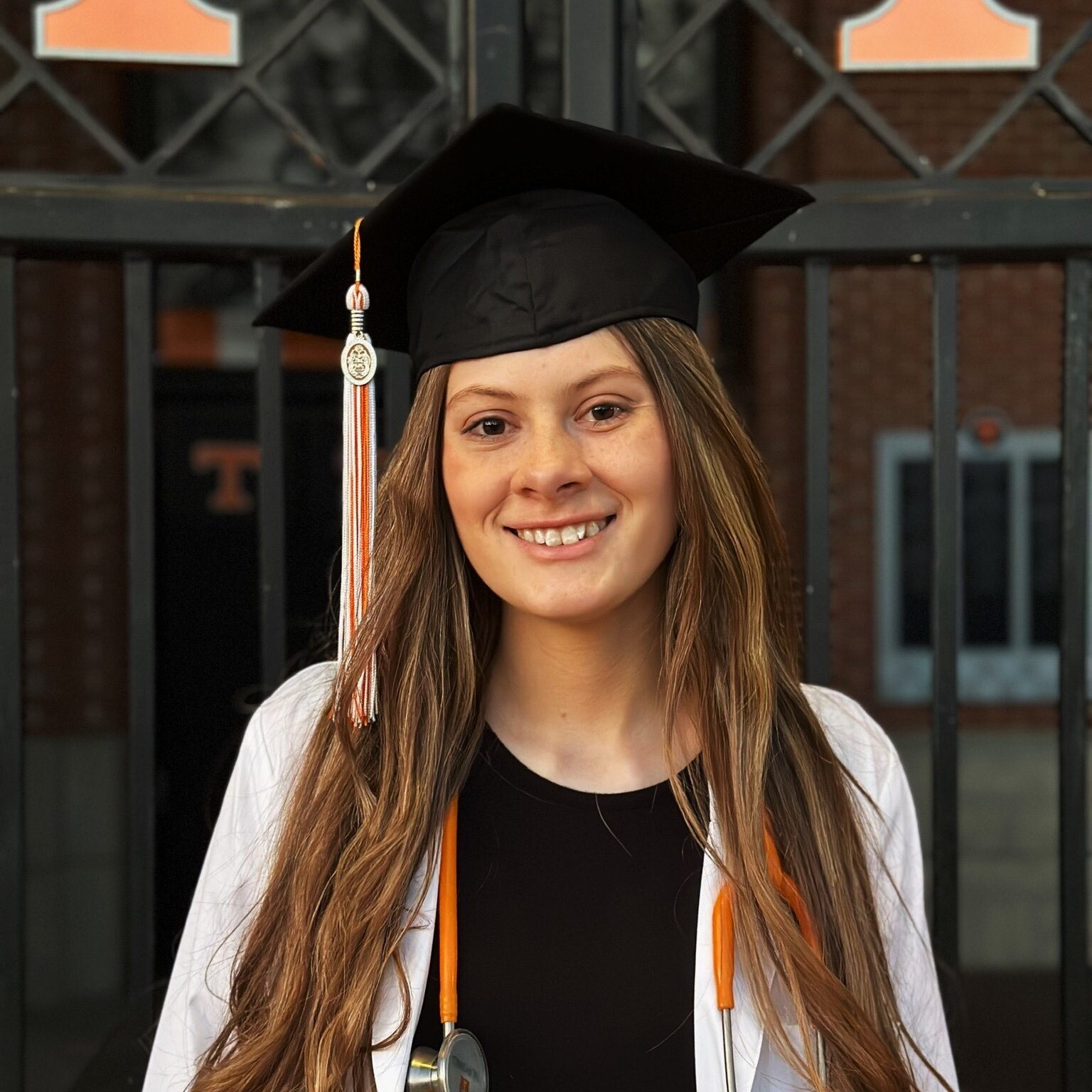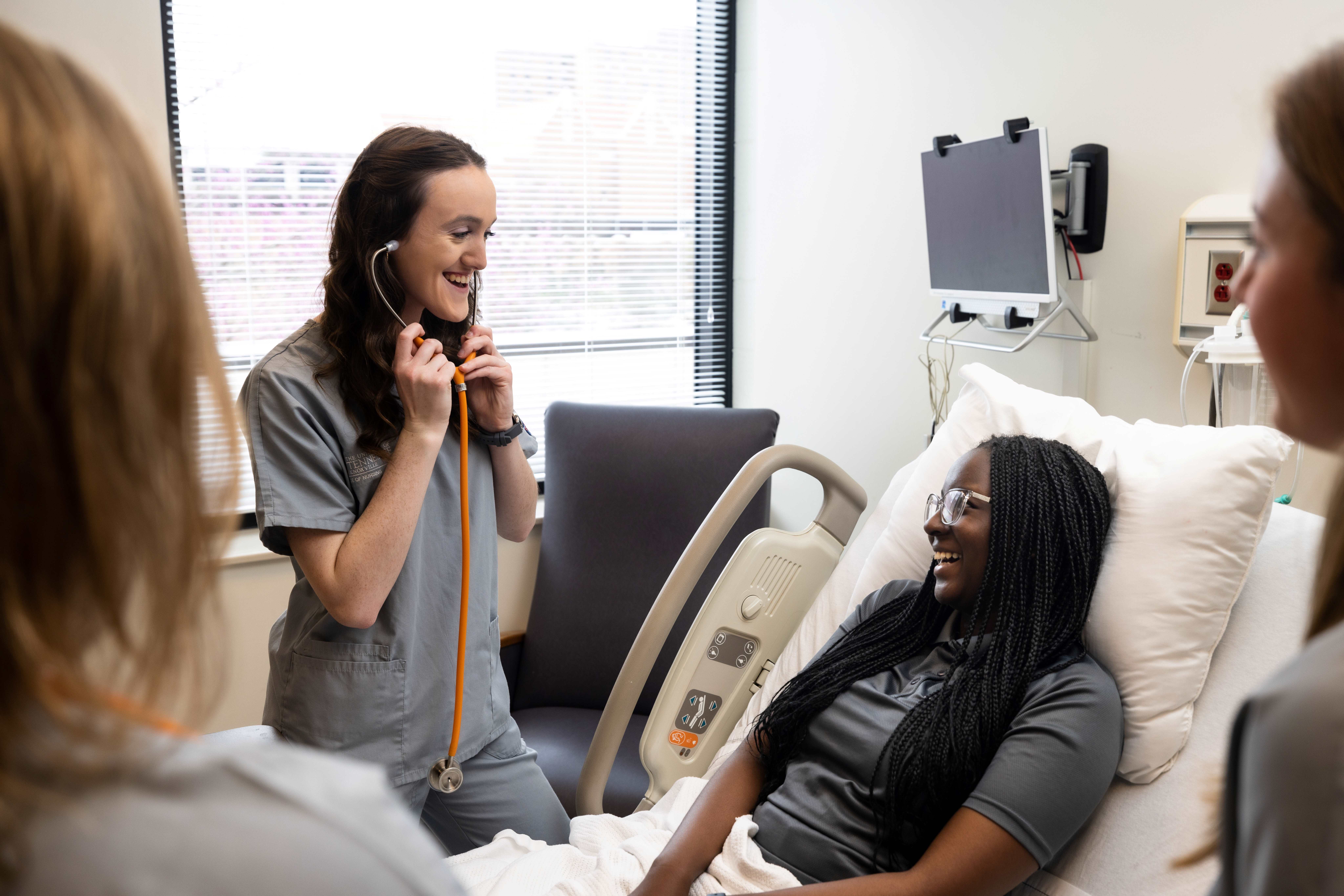In one of her nursing classes, recent graduate Rebecca Fawver made a lanyard clip to serve as a visual reminder that caring for herself is key to caring for her patients.
Her clip includes a photo of her with her fiancé; a reminder to use breathing exercises―Inhale 1-2-3-4, hold it 1-2-3-4, exhale 1-2-3-4―to de-stress; and one of her favorite quotes, from The Help: “You is smart. You is kind. You is important.”
Making lanyard clips is just one way faculty in the College of Nursing help their students craft coping strategies for a career that is physically, mentally, and emotionally demanding.
“Nurses just give, give, give,” said Dean Victoria Niederhauser. “But it’s like they tell you in an airplane—if you don’t put your oxygen mask on first, you’re going to run out of steam.
“We need to teach this generation of nursing students how to take care of themselves so they can have a long, wonderful career as a nurse, taking care of others.”
Condition: Critical
Because of the rigors of the job, “nurses tend to have a lot of guilt about taking care of themselves,” said Allyson Neal, clinical associate professor and assistant dean of graduate programs, who is a trained psychiatric mental health nurse practitioner.
They give up their day off to fill a shift. They feel guilty about taking breaks, even bathroom breaks. They skip lunch to see patients.
At the same time, she said, health care is more challenging than ever.
People are living longer than in the past, and many struggle with chronic illnesses. Environmental issues like poor air quality exacerbate ailments. Poverty continues to force some patients to choose between buying food or medicine. And workplace violence is a growing threat to health care professionals.
And then there was―is―COVID-19.
“The pandemic really stretched health care to the brink,” Neal said.
Citing a 2022 survey of more than 53,500 RNs and LPNs across 45 states, the Journal of Nursing Regulation reported that 50.8 percent of nurse respondents felt emotionally drained, 56.4 percent felt used up, 49.7 percent felt fatigued, 45.1 percent felt burned out, and 29.4 percent felt at the end of their rope a few times a week or every day. The issues were most pronounced among nurses with 10 years of experience or less.
Experts agree that the already-critical nursing shortage is in danger of getting even worse.
The college is trying to close the gap by increasing its enrollment―this fall could see the largest-ever entering class, with about 300 new BSN students. But even the first steps of a nursing career are challenging. “Nursing school is, in itself, pretty traumatic,” said Shelia Swift, executive associate dean of academic affairs. “It’s hard. It’s a lot of hours in clinicals and studying.”
So how does the College of Nursing, which receives about 4,000 applications each year, choose a diverse set of students who are likely to succeed as nurses?
“Traditionally our college has relied heavily on academic metrics for admission,” said Jada Russell, the college’s executive director of academic advising and enrollment management. “Now we’re exploring a more holistic approach.”
Russell said faculty say students with leadership skills and self-confidence who have set long-term goals for themselves and who value community involvement seem to thrive in nursing school―and in nursing.
Treatment Plan
“Our students are highly capable, highly motivated,” Russell said. “However, this may be the first time they’ve been academically challenged or even emotionally challenged.”
First-year nursing students are encouraged to take a First-Year Studies class designed just for them. It provides information about campus resources like the Student Success Center and the Student Counseling Center and lets students get to know college administrators.
De-stressing techniques are part of the curriculum.
“We incorporate small little things that they can use over and over,” Neal said. “Our goal is for them to start building these things into their daily living.”
For instance, many nursing faculty lead students in moments of mindfulness before difficult exercises or exams. Classes touch repeatedly on healthy behavior, including good nutrition and getting enough sleep, and offer tips for taming escalating emotions. Earlier this year, college faculty, staff, and students gathered for yoga on the Ayres Hall lawn.
Faculty and staff also keep their eyes open for signs of crisis.
Russell’s office has created a student alert form that faculty can use to report concerns about a student’s academic performance, attendance, or general well-being.
When a report is filed, the student is invited to meet with their academic advisor. They are reminded about campus resources, and staff members offer to accompany them to the Student Counseling Center to receive immediate assistance if needed.
Niederhauser said nursing faculty are also urged to be role models, showing students how hobbies and a healthy work–life balance can keep stress at bay.
Faculty have gathered to decorate Valentine’s Day cookies and paint flowerpots. They’ve started a pickleball group, and they’ve enjoyed trivia night at a local pizzeria. Niederhauser holds periodic Walk with the Dean events in nice weather.
Well Taught
Fawver, now a labor and delivery nurse at Fort Sanders Medical Center in Knoxville, said the college’s emphasis on self-care helped her move from the classroom to the real world with greater confidence.
And when she starts feeling overwhelmed, she refers to the advice on her lanyard clip.
Inhale 1-2-3-4, hold it 1-2-3-4, exhale 1-2-3-4.
“I know that going into practice is very different than being in school,” Fawver said. “But the experiences I had in nursing school really prepared me.”



